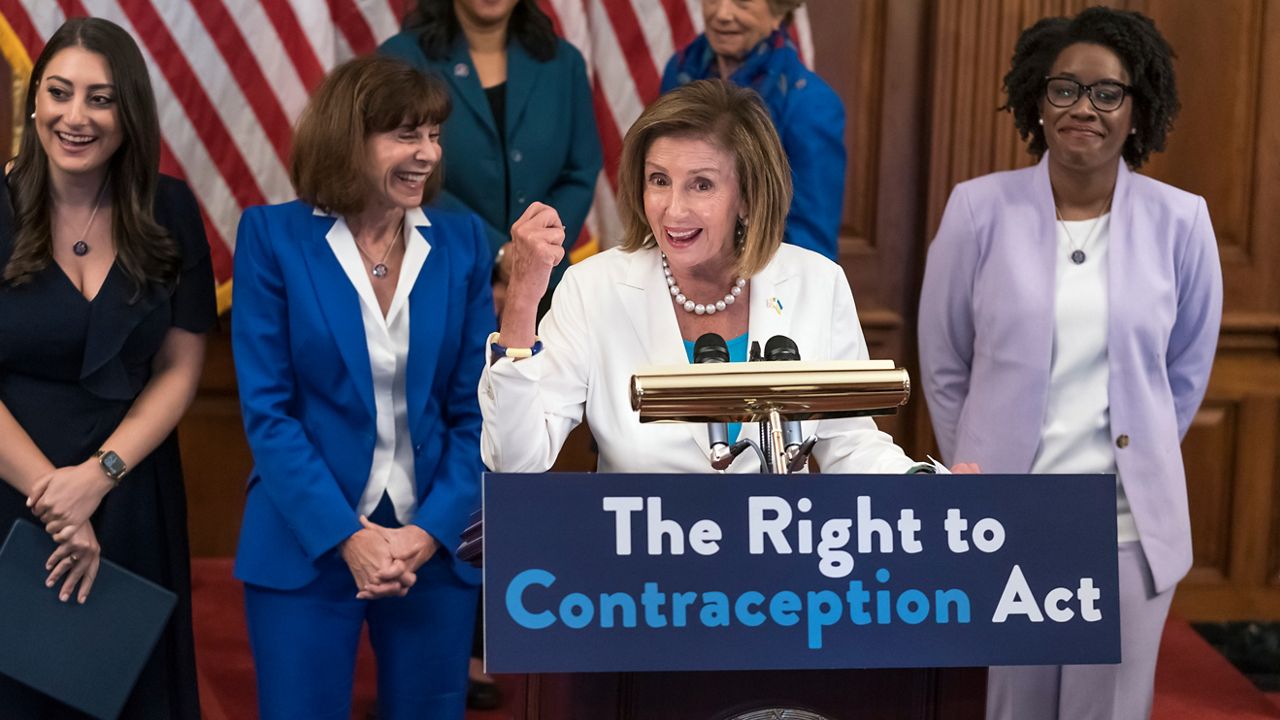The House of Representatives on Thursday passed a bill aimed at protecting access to contraception nationwide, the latest in a series of votes aimed at rebuking the Supreme Court in the wake of the decision to overturn Roe v. Wade.
The final vote was 228-195, with two voting "present." Eight Republicans joined all present Democrats to pass the measure, including Reps. Adam Kinzinger, R-Ill., Liz Cheney, R-Wyo., John Katko, R-N.Y., Anthony Gonzalez, R-Ohio, and Nancy Mace, R-S.C., who wore a sign on her back Thursday that read "My state is banning exceptions, protect contraception."
All of the 195 "no" votes were cast by Republicans.
The bill, known as the Right to Contraception Act, would “codify the right for Americans to access birth control into federal law.” It explicitly allows the use of contraceptives and gives the medical community the right to provide them, covering “any device or medication used to prevent pregnancy.” Listed examples include oral contraceptives, injections, implants like intrauterine devices and emergency contraceptives, which prevent pregnancy several days after unprotected sex.
The measure was introduced last week by Reps. Kathy Manning, D-N.C., Nikema Williams, D-Ga., Sara Jacobs, D-Calif., and Annie Craig, D-Minn. It faces an uphill battle in the 50-50 Senate, where it would need the support of 10 Republicans to overcome the filibuster.
The vote was a direct rebuke to last month Supreme Court ruling in Dobbs v. Jackson Women's Health, which overturned Roe v. Wade, the landmark 1973 decision which guaranteed the right to an abortion nationwide.
“This extremism is about one thing: control of women," Manning said. "We will not let this happen."
In a concurring opinion to last month's ruling, Justice Clarence Thomas wrote that the high court “should consider” a number of other key rulings, including Obergefell v. Hodges, which guaranteed the right for same-sex couples to marry, and Griswold v. Connecticut, which protects the right of marital privacy against state restrictions on contraception.
"In future cases, we should reconsider all of this Court’s substantive due process precedents, including Griswold, Lawrence, and Obergefell,” Thomas wrote. “Because any substantive due process decision is ‘demonstrably erroneous’ … we have a duty to ‘correct the error’ established in those precedents.”
In response, the House last week voted to pass two bills aimed at protecting access to abortion nationwide, and on Wednesday passed a bill codifying marriage equality into law.
Republicans accused their Democratic colleagues of manufacturing a crisis, with New York Rep. Claudia Tenney saying that their opponents were seeking to "distract and scare the American people and score cheap political points" with Thursday's vote.
"If we allow the majority to undermine constitutional safeguards for an imagined and fake emergency, they will create more imagined emergencies in the future to violate and undermine our constitutional principles," Tenney said.
But Democrats said that the bill is necessary to preempt possible action from the Supreme Court.
"They want to turn back the clock," House Speaker Nancy Pelosi, D-Calif., said at her weekly press conference. "Democratic women in Congress are saying we're not turning back."
Referencing her floor remarks Thursday, Pelosi asked Republicans: "Do you even have any idea of what's going on in your own homes when it comes to contraception, family planning, birth control? Should we have a session on the birds and the bees so you have a further understanding of what this is?"
"You don't want birth control, but you want control of women," she continued. "And that's our fight: servitude against that."
The Associated Press contributed to this report.



